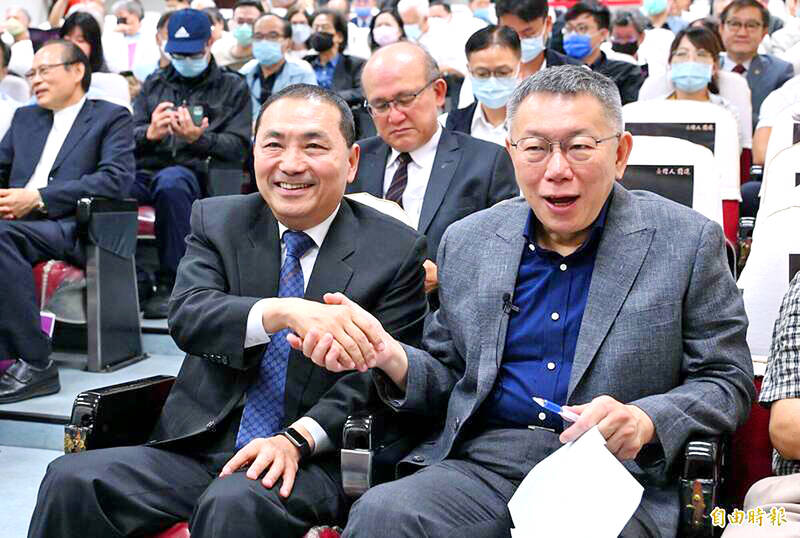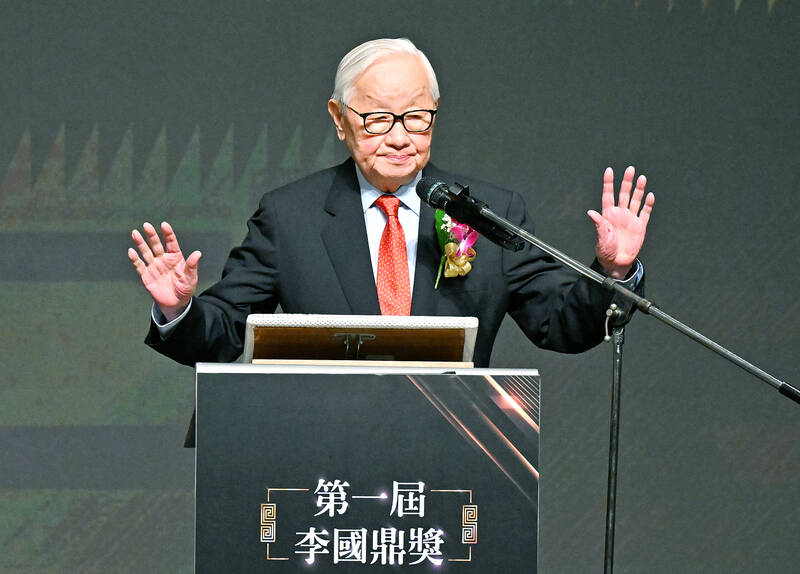“Stark choices confront Taiwan voters” screamed the title of a recent piece in the journal of the Center for Strategic & International Studies. The piece went on the usual way, to present the differing views of the candidates on relations with the People’s Republic of China (PRC).
As seen from the US, the election, like every election, is all about the cross-strait relationship. That is sad, because given Taiwan’s position in the US-led security, many of Taiwan’s domestic security failures, from the lack of a meaningful national civil defense program to the nation’s crazed land use laws to its failure to retain talent to the falling birth rate, are issues that impinge on national security. The US should be prodding Taiwan to meaningfully address these issues.
In Taiwan, where there is a widespread social consensus that rejects being annexed to the PRC, the candidates struggle to differentiate themselves from one another. Polls show that Democratic Progressive Party (DPP) presidential candidate William Lai’s (賴清德) support is limited to the DPP base, while Taiwan People’s Party (TPP) candidate Ko Wen-je (柯文哲) and Chinese Nationalist Party (KMT) candidate Hou You-yi (侯友宜) divide the pan-blue vote.

Photo: Tang Shih-ming, Taipei Times
Ko even appeared in public with longtime far-right KMT stalwarts Alex Tsai (蔡正元) and Chiu Yi (邱毅), perhaps signaling that he is going to ruthlessly hollow out the KMT base, but also a likely sign that he is Beijing’s preferred candidate.
The struggle of all to move beyond these bases, along with the large number of uncommitted voters, signals that voters do not find the candidates to be different in important ways. The only starkly contrasting candidate is the far-right billionaire independent candidate and Hon Hai Precision Industry Co founder Terry Gou (郭台銘), who will probably finish with around 5 percent of the vote, and whose campaign is currently undergoing multiple investigations for buying signatures and other campaign law violations during his signature drive.
When the election season began, many of us watching were hoping that at last domestic policy might become a key driver.

Photo: Taipei Times
Last week candidates began revealing their public policy platforms. Lai promised to invest millions in a new sports ministry, which is clearly a pressing need. Ko came out with a series of policy initiatives to spur the birth rate, including increasing the subsidies for having a baby and expanding maternity leave. In September, candidate Hou promised rent subsidies for larger families, while that same month the cabinet raised the monthly subsidies for child care, following policies it established back in 2018. Last month it raised the subsidy for fertility treatments.
To address the plummeting birth rate, the candidates are talking about subsidies for families, which do not work. Only Ko is talking about immigration. The disappearance of immigration is striking, given that the Ministry of Interior (MOI), rebutting claims that people are leaving Taiwan, released figures last week showing that immigration has risen 25 percent in the last 5 years. That is despite the roadblocks the bureaucracy throws up to stop it.
Nor are labor and work culture reforms on anyone’s plate. Tax the wealthy? Reform Taiwan’s broken education system? Not a chance. On energy, they all offer nods to renewables and nuclear power. The DPP, which ostensibly has a nuclear-free homeland policy, has quietly been talking about re-opening at least one of the power plants, coming to slow convergence with the pro-China side’s nuclear policies. Naturally no party has a serious proposal for dealing with the plants’ high level nuclear waste, whose removal could extend their lives for another decade.

Photo: Liao Chen-huei, Taipei Times
Ko also discussed the “five shortages” (五缺), a catchphrase politicians now use to encapsulate the problems of land, water, talent, labor and energy shortages, all the result of public policy failure dating back 30 years. The discourse on the nation’s future remains trapped in center-right developmentalist tropes that treat humans as inputs to GDP.
Meanwhile on the foreign front things are stereotypical. The DPP’s attempt to consolidate its base by playing up the PRC threat is eliciting shrugs from voters, because being Taiwanese and caring for its security is now the consensus identity. Protecting Taiwan was a powerful theme in the 2016 election, when the threat was actually lower. But this generation treats the PRC threat as the background hum to its increasingly difficult and futureless daily lives.
Also illuminating is the simple fact that no party’s cross-strait policies or domestic policies dominate the news cycle. None of the candidates has spoken about foreign policy outside the Taiwan Strait. What will the policy of Ko and Hou be toward India, Japan and southeast Asia? Towards the nations that recognize the Republic of China (ROC)? Towards Europe, especially eastern Europe?
Instead, the media is focused on the negotiations between Ko and the KMT over how their respective parties will cooperate in the election. As always, instead of pushing the envelope, making the candidates state their positions on critical issues such as the Go South policy or immigration or wage stagnation, the media is affirming the boundaries of the discourse by presenting political activity as entertainment.
Taiwan’s relentless commitment to neoliberal centrism has come home to roost. How can voters see any meaningful differences here? No wonder uncommitted voters in some polls outnumber the supporters of the two pan-blue candidates.
This is not to suggest that there are no differences among the parties. But the narrow range of the policy discussion has made it impossible for strong differentiation to occur. It is defeating reform. It is making dull what should be a stupendously consequential election taking place against a generational transition.
The consequences of steering for the center-right also mean that the government does not lead on key issues, especially immigration and civil defense, for fear of exiting the center.
Center-right developmentalist thinking has become the prison in which public policy goes to die. The DPP can escape any time it wants, by articulating and legislating a progressive policy platform.
I am not holding my breath.
Notes from Central Taiwan is a column written by long-term resident Michael Turton, who provides incisive commentary informed by three decades of living in and writing about his adoptive country. The views expressed here are his own.

This month the government ordered a one-year block of Xiaohongshu (小紅書) or Rednote, a Chinese social media platform with more than 3 million users in Taiwan. The government pointed to widespread fraud activity on the platform, along with cybersecurity failures. Officials said that they had reached out to the company and asked it to change. However, they received no response. The pro-China parties, the Chinese Nationalist Party (KMT) and Taiwan People’s Party (TPP), immediately swung into action, denouncing the ban as an attack on free speech. This “free speech” claim was then echoed by the People’s Republic of China (PRC),

Exceptions to the rule are sometimes revealing. For a brief few years, there was an emerging ideological split between the Democratic Progressive Party (DPP) and Chinese Nationalist Party (KMT) that appeared to be pushing the DPP in a direction that would be considered more liberal, and the KMT more conservative. In the previous column, “The KMT-DPP’s bureaucrat-led developmental state” (Dec. 11, page 12), we examined how Taiwan’s democratic system developed, and how both the two main parties largely accepted a similar consensus on how Taiwan should be run domestically and did not split along the left-right lines more familiar in

As I finally slid into the warm embrace of the hot, clifftop pool, it was a serene moment of reflection. The sound of the river reflected off the cave walls, the white of our camping lights reflected off the dark, shimmering surface of the water, and I reflected on how fortunate I was to be here. After all, the beautiful walk through narrow canyons that had brought us here had been inaccessible for five years — and will be again soon. The day had started at the Huisun Forest Area (惠蓀林場), at the end of Nantou County Route 80, north and east

Specialty sandwiches loaded with the contents of an entire charcuterie board, overflowing with sauces, creams and all manner of creative add-ons, is perhaps one of the biggest global food trends of this year. From London to New York, lines form down the block for mortadella, burrata, pistachio and more stuffed between slices of fresh sourdough, rye or focaccia. To try the trend in Taipei, Munchies Mafia is for sure the spot — could this be the best sandwich in town? Carlos from Spain and Sergio from Mexico opened this spot just seven months ago. The two met working in the